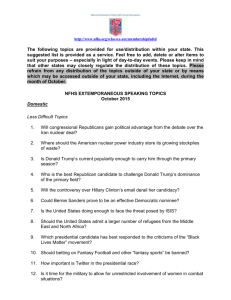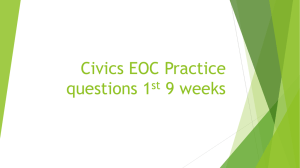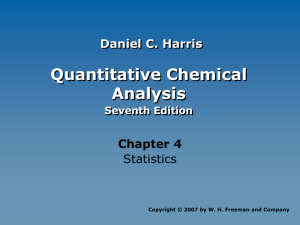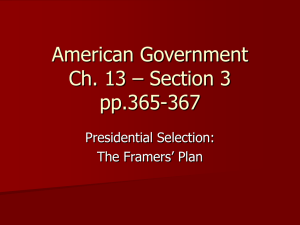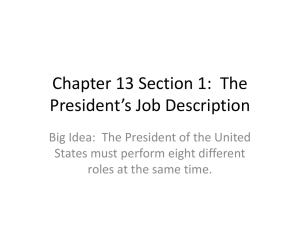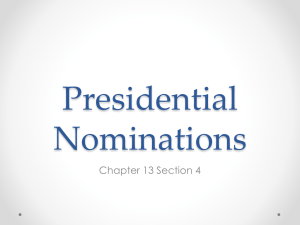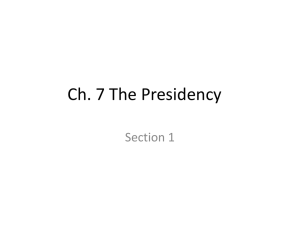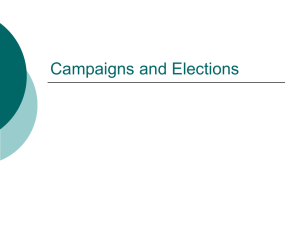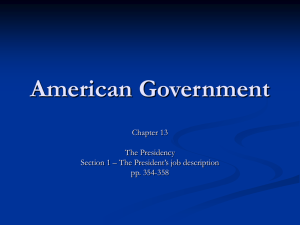File - Steven St. Onge Portfolio
advertisement
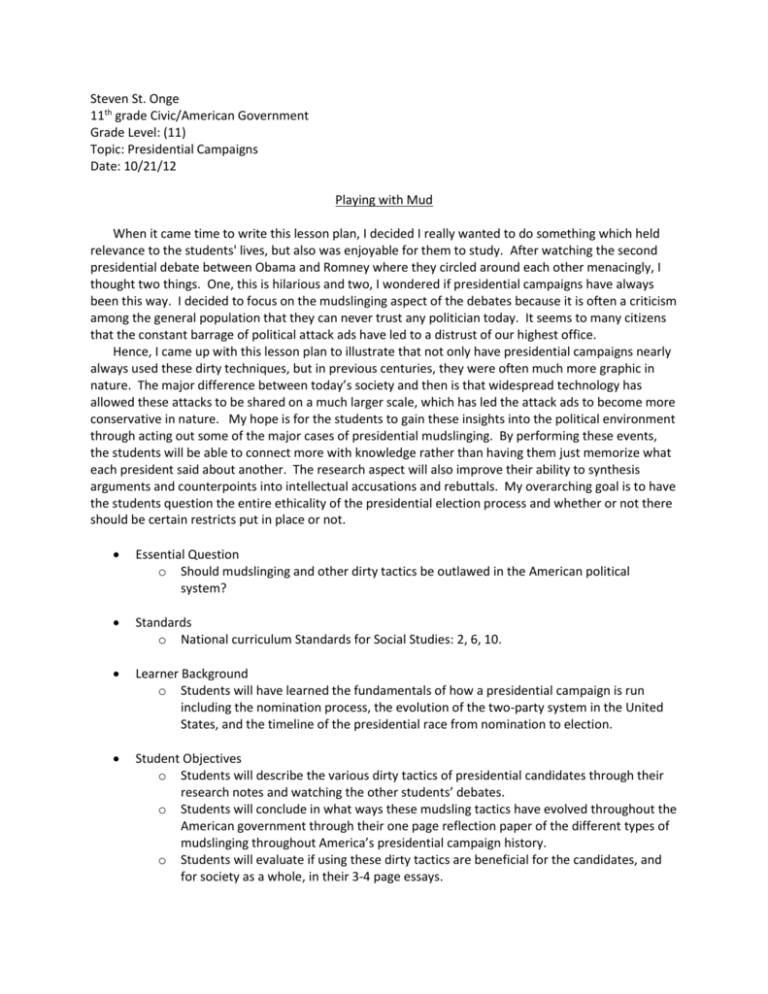
Steven St. Onge 11th grade Civic/American Government Grade Level: (11) Topic: Presidential Campaigns Date: 10/21/12 Playing with Mud When it came time to write this lesson plan, I decided I really wanted to do something which held relevance to the students' lives, but also was enjoyable for them to study. After watching the second presidential debate between Obama and Romney where they circled around each other menacingly, I thought two things. One, this is hilarious and two, I wondered if presidential campaigns have always been this way. I decided to focus on the mudslinging aspect of the debates because it is often a criticism among the general population that they can never trust any politician today. It seems to many citizens that the constant barrage of political attack ads have led to a distrust of our highest office. Hence, I came up with this lesson plan to illustrate that not only have presidential campaigns nearly always used these dirty techniques, but in previous centuries, they were often much more graphic in nature. The major difference between today’s society and then is that widespread technology has allowed these attacks to be shared on a much larger scale, which has led the attack ads to become more conservative in nature. My hope is for the students to gain these insights into the political environment through acting out some of the major cases of presidential mudslinging. By performing these events, the students will be able to connect more with knowledge rather than having them just memorize what each president said about another. The research aspect will also improve their ability to synthesis arguments and counterpoints into intellectual accusations and rebuttals. My overarching goal is to have the students question the entire ethicality of the presidential election process and whether or not there should be certain restricts put in place or not. Essential Question o Should mudslinging and other dirty tactics be outlawed in the American political system? Standards o National curriculum Standards for Social Studies: 2, 6, 10. Learner Background o Students will have learned the fundamentals of how a presidential campaign is run including the nomination process, the evolution of the two-party system in the United States, and the timeline of the presidential race from nomination to election. Student Objectives o Students will describe the various dirty tactics of presidential candidates through their research notes and watching the other students’ debates. o Students will conclude in what ways these mudsling tactics have evolved throughout the American government through their one page reflection paper of the different types of mudslinging throughout America’s presidential campaign history. o Students will evaluate if using these dirty tactics are beneficial for the candidates, and for society as a whole, in their 3-4 page essays. Materials o Worksheet for students to outline the different mudslinging techniques used by and against their representative presidential candidate. o Computer lab. o Books and articles related to presidential smear campaigns. Anything for a Vote by Joseph Cummings o Worksheet for students to keep track of the various political smear campaigns. Initiation o Students will begin the lesson plan with the teacher asking them to recall any political ad they had recently seen. The students will have the opportunity to describe as many ads as they can. o The students will then watch a select number of video clips which display obscene cases of political mudslinging. o The students will then be told that they will be exploring how mudslinging has affect political outcomes and how it has evolved to this point in the American society. Learning Activities o The students will be broken up into groups of two, and in some cases three to research a particular presidential campaign’s implementation of mudslinging. o Although class sizes will vary the amount of campaigns the students will research, the following presidential campaigns should be touched upon: Jefferson vs. Adams 1796 and 1800 the first usage of mudslinging Lyndon Johnson v. Barry Goldwater the Daisy ad Andrew Jackson v. John Quincy Adams 1828 election Attack on Jackson’s wife George W. Bush v. John Kerry Swift boating and flip flopper Martin Van Buren v. William Henry Harrison Golden Spoon Oration Al Smith v. Herbert Hoover Catholicism and the Holland Tunnel Abraham Lincoln v. Stephen A. Douglas Physical description attacks. o Students will then take up the position of one of these presidential candidates. Not only will the students research the political acquisition that made against their opponent, but the students will also have to defend against the accusations that their opponent will level. Students will fill out the notes chart that the teacher will provide. o The next day, students will then act out some of the accusations the political candidates leveled upon one another in a debate style format. Students will follow along with the activity with a worksheet which allows them to highlight the key mudslinging accusations of each presidential contest. Closure o o Once this is formed, the students will then take their notes and synthesis how mudslinging has evolved by writing a one page reflection in class. For homework, students will write a 3-4 page essay in which they argue whether or not mudslinging should be banned from presidential elections. Assessment o Students will be informally assessed based on their attentiveness to their notes and research they take on both their own political candidates and the other groups’ presentations. o Students’ one page reflection and 3-4 page essays will be formally graded. o Students oral presentations will also be graded based upon effort, accuracy and clarity. Strategies for Differentiation o Differentiate through homogenous teams. Ensure that students are researching elections with peers who are at the same level so they are not dwarfed during the debate. o Students will be assessed through both informal and formal written and oral presentations. Strategies for Modification o ELL students will work with each other using sources that are familiar to their native languages. o Paraprofessionals will be used on hand to work through some of the most difficult historical innuendos. o ELL students could possibly research political mudslinging that has occurred in their native nation. Strategies for Accommodation o ELL students have the choice of either performing a shortened version of their debate, having the help of a translator, or through having a written debate with their peer.
